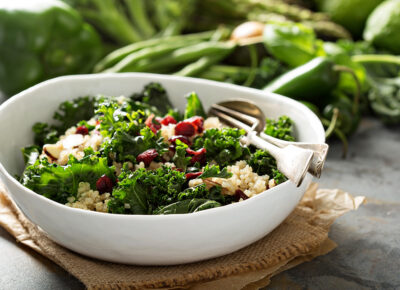There is NO DOUBT – that the fruits and vegetables that God gave us are incredible, and many are now being recognised as super-foods as they contain phyto-nutrients that when eaten together can have very powerful reactive effects on the health in the form of antioxidants – slowing ageing, helping to prevent cancers and a multitude of other diseases before they occur. Some are even being studied for their ability to destroy cancer cells after it has taken hold – for instance once study appeared to show that strawberries specifically targeted and neutralised oesophageal cancer cells.
It makes sense that foods contain chemicals that can protect our bodies right – God doesn’t make mistakes and he didn’t with food. But as always – there are people on this earth who are more interested in your wallet than your health, that will mix a little truth and lies and bottle it to sell you something that it is not necessarily.
For many years I have heard so many people banding the idea of ‘flushing out toxins’ from out bodies for years. Having worked for (and eventually glad to leave when I discovered their practices were not all above board) a pharmaceutical company that produced real drugs that had real effects – it was also producing and profiting from a heck of a lot of snake-oil products – products that the CEO admitted (stupidly) I thought in a meeting he “would never take.”
As I was doing more research on this I came across an article on the NHS website – and rather than re-create this article – I thought since I am not a scientist or nutritionist – but rely on common sense and my own research and what I learned at college – to let someone who is. So here is the article on the NHS website taken from a PDF:
Detox – an often misused word
“Detox” is certainly a popular buzzword in the dieting world! The idea behind it is that we need to periodically clear the “toxic waste” from our body in order to stay healthy. In particular, we might be tempted to detox after over-indulging a little, for example at Christmas. Some of the claims made in relation to detox diets include: magical weight loss; improved digestion; improved hair, nails and skin; improved energy levels; boosted immune system; banishment of cellulite. Detox diets can last from around one day to around one month and may involve: Fasting for short periods of time Consuming only fruits and vegetables Cutting out wheat and dairy foods Consuming a limited range of foods Avoiding caffeine and alcohol Exploding the Myths If the human body really accumulated lots of toxins, then we would feel ill. The concept of detox diets is irrational and unscientific.
In actual fact, when you starve your body of calories your body will ultimately start to build up chemicals called ketones. These chemicals can result in nausea, dehydration, weakness, light-headedness and irritability. Further, a prolonged lack of protein causes your body to break down its own muscles and can compromise your immune system. The Virtues Of Fruit And Veg Proponents of the detox diets often promote the virtues of fruits and vegetables. Of course fruits and vegetables are an important part of a balanced diet and we should all eat at least five portions a day – with meals, as snacks and for desserts. They provide vitamins, minerals, antioxidants and dietary fibre, but no one fruit or vegetable can provide nutritional nirvana – it’s the variety that counts. Allergy to Wheat and Milk?
Those promoting detox diets often claim that to ‘detoxify’, the body needs to exclude foods such as wheat and dairy products. The reality is that these foods provide us with important nutrients. It is unnecessary and potentially harmful to exclude them from the diet. For those people who suspect they have a true allergy to milk, wheat, or any other food, the condition should be diagnosed by a qualified medical practitioner and, once diagnosed, managed under the supervision of a registered dietitian.
The Facts Fasting, or severely restricting food consumption, limits intake of energy and important nutrients that are needed for health and well-being. Rapid weight loss occurs when fasting or severely restricting dietary intake, but this weight loss is water, glycogen (the body’s carbohydrate stores) and muscle, rather than fat. You may feel fatigued and dizzy and it’s likely you’ll have less energy while you are following a detox programme that involves fasting. Further, if you are fasting your body won’t have the proper fuels available to carry out sustained exercise and activity – an important aspect of general well-being and healthy weight management. At the end the programme, when you return to your old eating habits, any weight lost is likely to go back on!
A Balanced Diet It does make sense to avoid excessive intakes of caffeine, alcohol and high-fat, high-sugar foods. However, if you want to maintain optimal health then the best approach is a balanced diet, with at least five portions of different fruit and vegetables a day; plenty of wholegrain cereals; lean meat, fish and alternatives and low fat dairy products. If you are looking to lose weight then consider reducing portion sizes, and don’t forget to take plenty of exercise. Further Information For accurate and balanced information on weight loss have a look at our fantastic interactive websites at www.bdaweightwise.com and www.teenweightwise.com. Both of these websites have been specially created by dieticians with a grant from the Department of Health.
These websites are packed full of information, practical advice and support for anyone who is managing their weight. All the information is independent, scientifically sound, and trustworthy! And what’s more – it’s all free! In Summary Detox diets are marketing myths rather than nutritional reality. They sound like a great concept and it would be fabulous if they really delivered all that they promised! Unfortunately, many of the claims made by detox diet promoters are wild and exaggerated – it’s best to stick to the sound, sensible, science-based advice you will always get from impartial, qualified, registered dieticians.
Amanda Johnson, Dietitian



